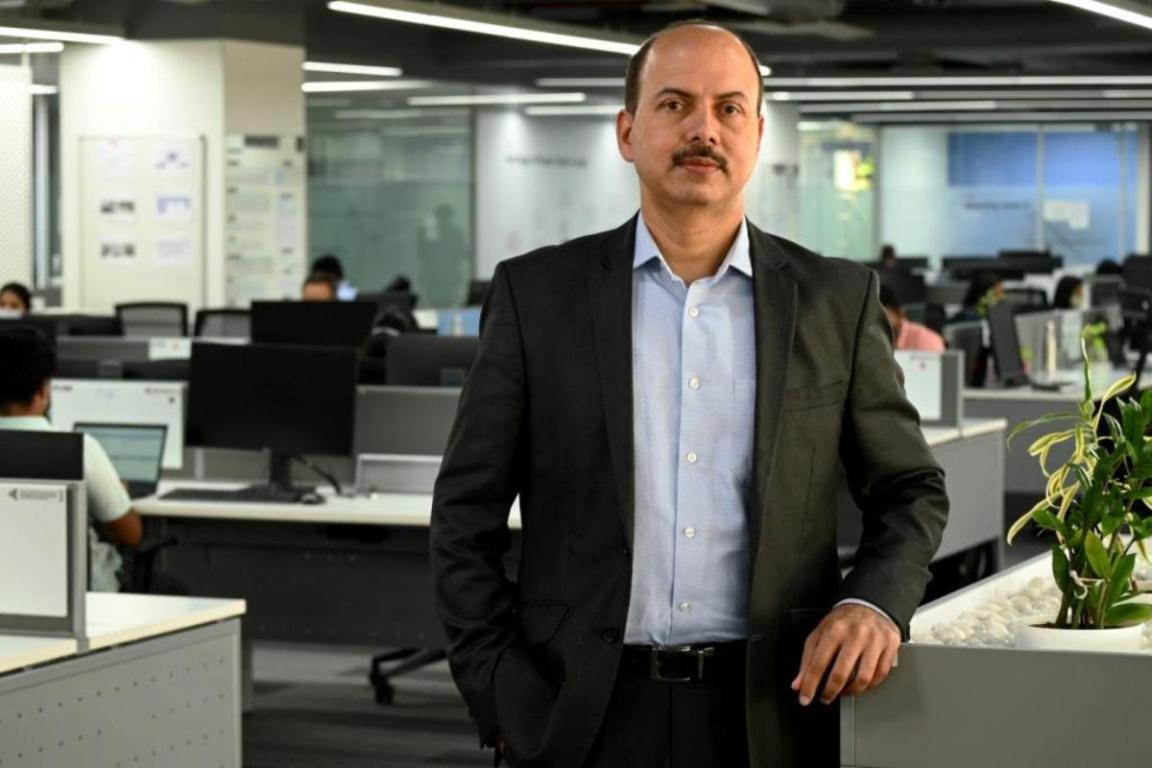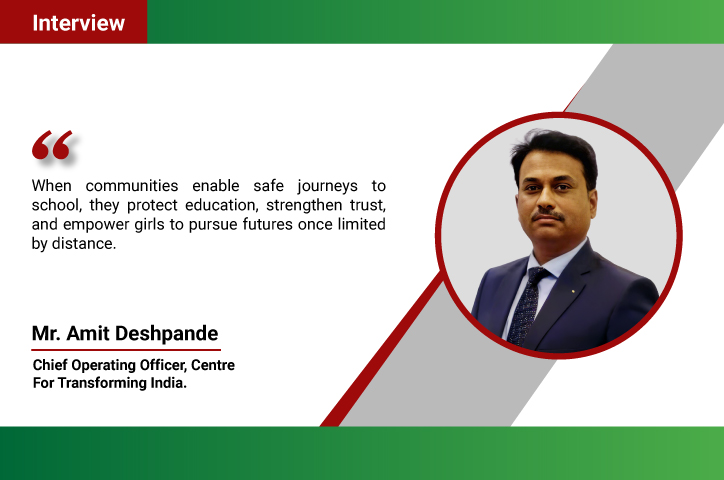In this comprehensive interview, Mr. Akilur Rahman, Chief Technology Officer and Executive Sponsor of CSR at Hitachi Energy India, discusses the company’s innovative integration of its core business with impactful Corporate Social Responsibility (CSR) initiatives. He highlights how Hitachi Energy India leverages its advanced technological solutions not only to drive the energy sector forward but also to address critical social, environmental, and educational challenges across the country. Mr. Rahman provides insights into the company's strategic focus on community empowerment, sustainability, and the development of future talent, showcasing how these efforts contribute to a more inclusive and sustainable future. Through this integrated approach, Hitachi Energy is creating long-term value for both the business and the communities it serves
Scroll down to read the full interview:
Q. How does Hitachi Energy balance its core business of energy solutions with its extensive CSR initiatives? What is the strategic alignment between these two facets of the company?
A. At Hitachi Energy India, our purpose is to advance a sustainable energy future for all. However, we also aim to be an enabler of holistic social change in the country. By integrating sustainability and social responsibility into every aspect of our operations, Hitachi Energy India maintains a conscious social outlook and this manifests itself in our CSR initiatives. Our CSR initiatives, which prioritize environmental sustainability, community development, and education, reflect our commitment on offering creative solutions & sustainable energyfor a low-carbon economy. We ensure that our innovations not only further business objectives but also addresses important societal concerns. This results in a holistic approach where social impact and commercial success are organically intertwined.Being a technology company with continuous innovation culture, we use the same common approach in the CSR with social innovation. We are creating innovation platform and structure so that the recipients can do their own innovation with our support which becomes sustainable.
Q. Given the rapid pace of technological advancements in the energy sector, how does Hitachi Energy ensure that its CSR initiatives are aligned with the evolving energy landscape?
A. Hitachi Energy India constantly leverages its latest technological developments to make sure that we are in line with the changing energy landscape. We keep a close eye on developments within the energy industry, including smart grids, renewable energy, and energy-efficient technology. Accordingly, we ensure that our CSR initiatives meet the changing demands of the environment and local communities. By taking a proactive stance, Hitachi Energy is able to maintain its leadership position in industry advancements and make sure that its corporate social responsibility endeavours are meaningful and relevant towards promoting a sustainable energy future. While the pace of technology advancement is high in industries, in the social sector, it’s the awareness, learning and practice which are more important. We try to bring in pace as required if it’s a community, school, college or university/institute of advance learning.
Q. The solar power project at Markazi High School is a commendable step. How does Hitachi Energy measure the long-term impact of such initiatives on the students, the school, and the community?
A. We use both quantitative and qualitative evaluations to determine the solar power project's long-term effects at Markazi High School. The organization monitors important performance indicators such as the school's overall improvement in operational efficiency, the number of hours of electricity available for instructional purposes, and the decrease in energy expenses. In order to assess how well learning environments, student performance, and community understanding of renewable energy have improved, surveys and feedback from students, teachers, and the community are also gathered. We also take a look at the project's long-term effects on education, environmental awareness, and local development by tracking these data points over time. What is important is: the students learning about sustainability and energy transition by seeing it themselves and experiencing it. This allows us to make sure the effort has a significant and long-lasting influence.
Q. The provision of e-carts to NIT Warangal is an interesting approach to promoting sustainable transportation. What data does Hitachi Energy have on the potential reduction in carbon emissions through this initiative?
A. Hitachi Energy looks at variables such as the quantity of e-carts deployed, their daily usage patterns, and the replacement of conventional fuel powered vehicles on campus to estimate the possible decrease in carbon emissions by providing e-carts to NIT Warangal. We also determine the total decrease in greenhouse gas emissions, including carbon dioxide, by comparing the emissions from conventional cars with the zero-emission operation of e-carts. The evaluation of the e-carts' environmental impact is further supported by statistics on their energy consumption, which is usually derived from renewable energy sources. We are able to measure the initiative's impact on reducing the campus's carbon footprint and advancing sustainable transportation habits due to this data-driven approach. Here again we encourage students themselves to measure the actual and potential emission/CO2 reduction which will have lasting impression on them to use it in future after they leave the campus.
Q. How does Hitachi Energy identify and prioritize the communities where it chooses to implement its CSR projects? What criteria are used to determine the areas of greatest need?
A. We focus on rural regions where there is a significant need for economic development. For this we focus on educating them and creating employment opportunities. These actions contribute to the economic growth and stability of local communities, fostering self-sufficiency and reducing poverty levels. Social issues including poverty reduction, healthcare, and education can all be directly addressed by CSR initiatives. Companies that support education projects help people get access to high-quality education, which empowers them and increases their chances of having a better future. We try to focus on the greatest need in and around our factory/office/project locations so that our employees also can contribute to the effort and we can easily work on continuously improving and enhancing the societal values.
Q. Given the emphasis on STEM education, how does Hitachi Energy plan to leverage its CSR initiatives to inspire young people to pursue careers in the energy sector?
A. Our commitment to sustainability goes hand in hand with our dedication to nurturing future talent. We believe that developing the next generation of leaders is crucial to achieving our long-term objectives. Hitachi Energy India mission goes far beyond simply delivering energy solutions. We strive to be a driving force for innovation in energy technology, leading the way toward a more sustainable energy future. At the same time, we are deeply committed to developing future talent, ensuring that the next generation is well-equipped to contribute to and advance our vision. Through this dual focus on technology and talent, we aim to create lasting, positive change in the energy sector and beyond.We also actively support and encourage students to connect with our leadership team, offering a platform to share ideas, experiences and insights. The company’s CSR initiatives are extensively discussed, providing students with a valuable opportunity to learn about and engage in meaningful discussions on the importance of energy transition and energy efficiency. This exposure helps them understand the broader impact of corporate responsibility and fosters a deeper appreciation for the role they can play in driving positive change within the community.
Q. How does Hitachi Energy collaborate with local governments and other stakeholders to ensure the sustainability and scalability of its CSR projects?
A. Apart from these efforts, Hitachi Energy India has invited government officials and faculties from educational institutions to showcase and promote the thought of onboarding more women students and continuing the success story of the pilot project every year.The programs not only draw attention to the accomplishments of the project but also cultivates a cooperative atmosphere in which educational institutions and local governments may work together to take the program to the next level. By involving these parties, we make sure that the CSR initiatives are in line with the objectives of regional development and get the funding they require to grow. Enhancing the sustainability and impact of these projects, Hitachi Energy India also organizes training sessions, forums, and workshops where new ideas are generated, and best practices are shared. Hitachi Energy India has also developed a model that may be applied in other areas, resulting in long-term social and economic advantages and enabling local communities to take charge of the projects by working together.
Q. In a world increasingly focused on ESG factors, how does Hitachi Energy communicate the value of its CSR initiatives to investors and other stakeholders?
A. Hitachi Energy incorporates Environmental, Social, and Governance (ESG) considerations into its overall company strategy and reporting to convey to investors and other stakeholders the value of its CSR programs. The business discloses in a clear and comprehensive manner how its CSR initiatives support ESG objectives, emphasizing the benefits to sustainability, community development, and moral governance. Metrics and case studies are included in regular publications, including sustainability reports and ESG updates, to show the observable advantages of these projects, like lower carbon emissions, better community well-being, and better educational results. In addition, we actively address the significance of CSR in generating long-term corporate value with investors and stakeholders through seminars, webinars, and meetings. By doing this, it effectively conveys how these programs contribute to risk management, brand reputation, and competitive advantage. Many of our CSR initiatives and their results are picked up by media and published in public forum. This provides very good practical examples to our investors and stakeholders about our CSR program values.


















